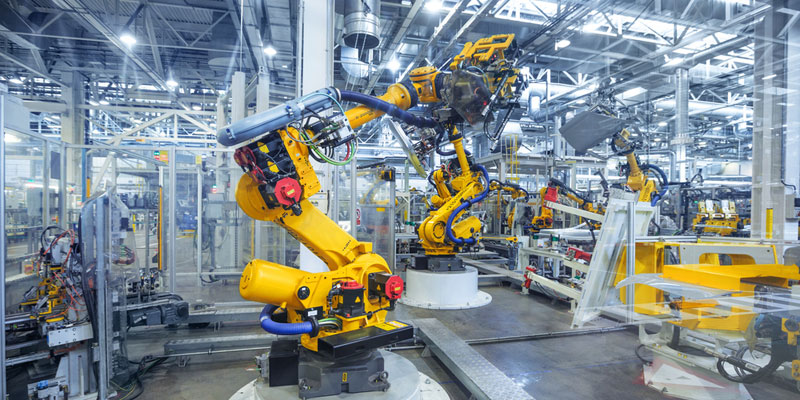
According to a recent forecast by Gartner, the enterprise and automotive Internet of Things (IoT) market will grow up to 5.8 billion endpoints in 2020, making it a 21% increase from 2019 while connecting 20.4 billion “Things”. With a high level of automation, collection & exchange of data across critical processes, the global manufacturing sector has already taken a lead in this direction. While the deployment of IoT in industries has turned factories into smart factories, it has been also estimated that more than 30% of our interactions with technology will be through conversing with smart machines and simultaneously making shop floors much safer, productive and innovative by 2020.
The Industrial IoT is driving unprecedented disruption in an industry that has struggled in recent years due to talent shortages, and this offers hope for the industry’s future. The IIoT can transform traditional, linear manufacturing supply chains into dynamic, interconnected systems that can more readily incorporate ecosystem partners. As key enablers of digital supply networks, IIoT technologies help to change the way the products are made and delivered, making factories more efficient, ensuring better safety for human operators, and, in some cases, saving millions of dollars.
Today, as world gets incredibly connected and progressing towards industry 4.0, India will have to move along with it at a similar pace. The manufacturing industry in India has experienced different development levels for some time and ushers to be one of the most elevated developing segments in the coming years. As India turns out to be progressively associated, digitalization – utilizing digital technologies to change business activities – is a key differentiator that will empower organizations to stay focused.
Implementing IIoT in Indian manufacturing markets means it takes along the networked sensors and intelligent devices and put those technologies to use directly on the manufacturing floor, collecting data to drive artificial intelligence and predictive analytics. This means that manufacturers now will have detailed real-time data at every point during the manufacturing process and through the distribution chain. IIoT is already a reality and many companies are seeking after its benefits and opportunities. Businesses are achieving immense digital transformation through data driven insights and proactive maintenance of the entire manufacturing value chain. By streamlining supply chains and processes, reducing operational costs, improving safety and environmental conditions in the workplace, manufacturers can afford to focus more on improving competitiveness and business strategies. The advantages are not just limited to increased production efficiency, they also result in derived benefits such as increased transparency, improved quality control and traceability.
The increased adoption of Industrial IoT across industry segments and businesses is opening up tremendous possibilities in terms of business and revenue models. While IoT is increasingly being successfully adopted in many scenarios, there are an equal number of failed attempts, if not more – the reason being choosing the right software platform for the industry type.
In terms of the technology and engineering aspects of implementing IIoT, there currently exists a clear separation between the hardware and software platforms, with the majority of them focused on the hardware. However, the dynamic challenges of manufacturing industry like presence of traditional PLCs, devices, need to scale to additional units, need to integrate with rest of the enterprise applications etc calls for a reliable, flexible and device agnostic software platform ; a software platform with powerful Industrial IoT features like device life-cycle management, seamless integration, connectivity networks & cross-device communications, multi-layer security, protocols for data normalization, storage & processing and support for real-time monitoring, analytics & visualizations. Of these, areas such as device management, IoT data analytics and IoT software system scalability and performance characteristics are of unique interest while implementing IoT in industries that only an IoT software platform can address upon.
Manufacturing players should focus on investing in solid software platforms that can scale beyond the current requirements and be accommodating of new and old hardware setup, for smooth adoption, best operational practices and maximum returns. Besides CTOs training the in-house staff and understanding the dynamics of new and emerging technologies like IIoT, AR and the likes, Indian service channel for manufacturing industry should start flexing their teams to get up to speed on the above said technologies. Considering the immense demand for OT services that is growing beyond traditional IT, it’s time channels players and service providers choose the right platform that can help them quickly develop, market and deploy solutions that best fit customer requirements. It is highly imperative for these players to choose the right platform that can offer end to end capabilities and also be compliant with the different types of industrial hardware.
Add to it, with the current rate of growth of manufacturing industry in the country and PM’s emphasis of ‘Make in India’ movement, India is predicted to become 5th largest manufacturing country in the World, according to IBEF (Indian Brand Equity Foundation).
This encouraging trend only proves that there’ll be excessive competition among players and niche, reliable IIoT solutions will help amp up the game and result in sustainable business outcomes.
*Originally published in Industrial Automation| May 12, 2020